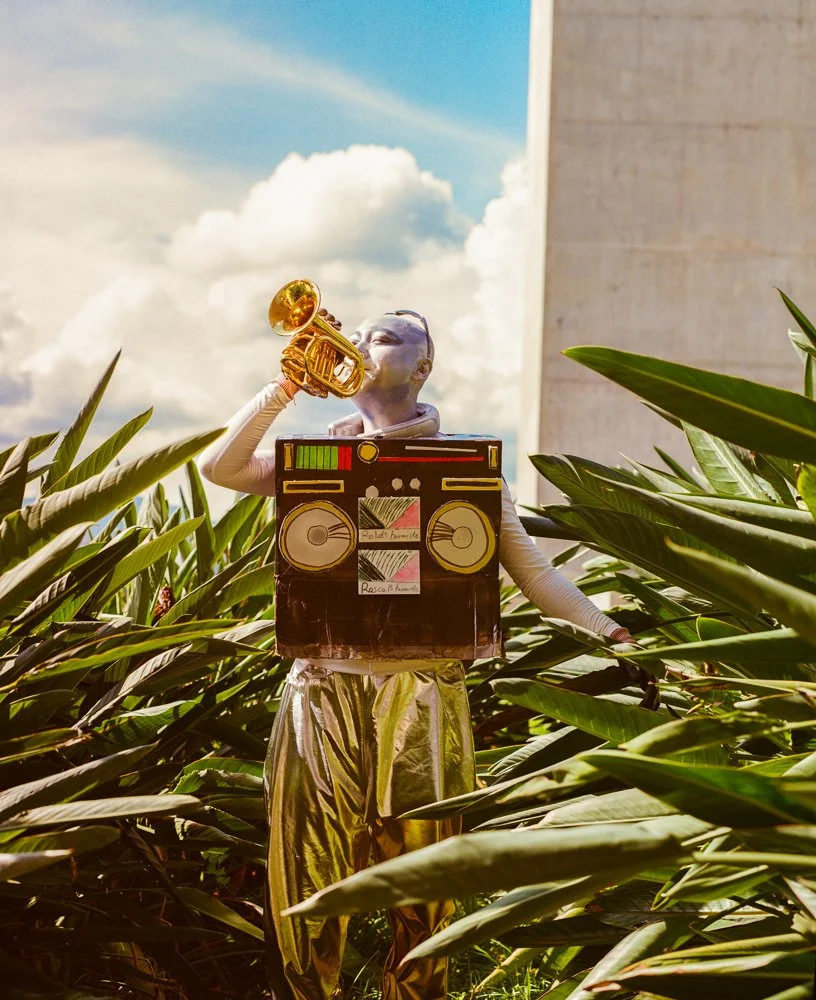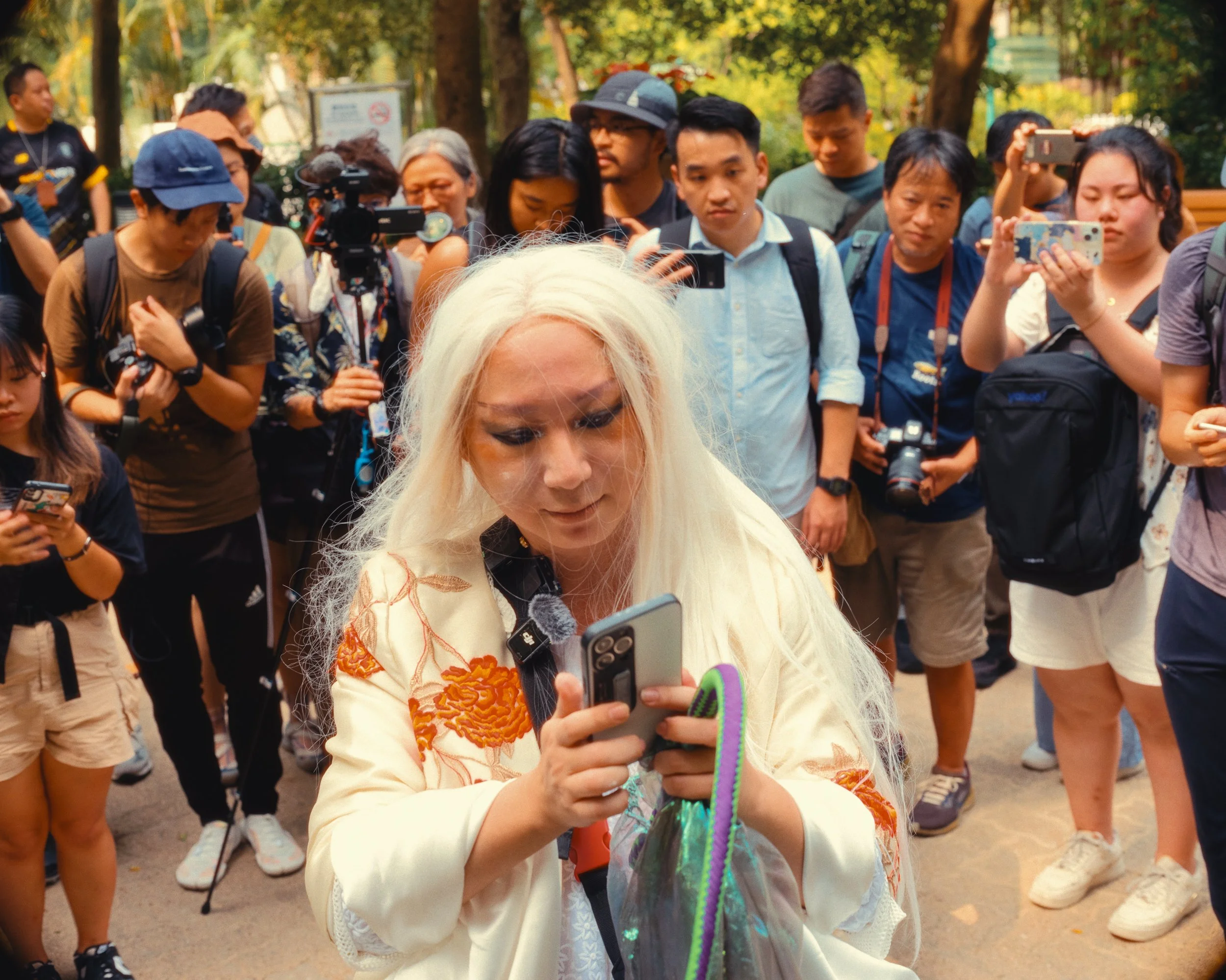Confessions of a Flower Spirit
As a documentary photographer, I've always been drawn to the shimmering, elusive truths found at the intersection of identity and belonging. My camera is my co-conspirator in this quest, helping me craft portraits that whisper tales of speculative fiction, drawing out the extraordinary from the everyday.
For the past few months, my long-term project, We Are the Things Monsters Love, has been a deep dive into the vibrant, often misunderstood, world of Hong Kong’s marginalized youth—a place where ancient myths fuse with the raw power of Voidpunk counterculture. It’s a space where being "monstrous" isn't a flaw, but a blueprint for survival, a pathway to sacred power.
My journey took an unexpected turn recently during my Director's Fellowship at the International Center of Photography in New York. My teacher, the brilliant Alexey Yurenev, handed me a challenge: "Read Max Pinckers' dissertation, specifically his chapter 'Speculative Documentary,' then go create something new." He didn't say it had to be connected to my existing project, just "new work." Little did I know, the universe was already plotting something extraordinary.
I devoured Pinckers' chapter, wrestling with his ideas of how documentary could be less about capturing "truth" and more about embracing "conjecture." He talks about a form of documentary that's okay with "perpetual uncertainty, contamination, contestation, befoggedness and messiness" – a fluid, mutable reality. I closed the PDF, my mind buzzing with possibilities, when my phone rang.
It was Holok Chen, a powerful presence in Hong Kong’s Voidpunk scene, known to many as the "Oracle of Voidpunk." They spoke with a quiet intensity, unfolding a plan: they were going to appear at Hong Kong Park, right by the marriage registration office, in full regalia. Holok would be embodying the "Flower Spirit," and their partner, a "Spotted Dove." As I listened, it was as if all of Pinckers' theories, which had felt abstract moments before, suddenly clicked into vivid, undeniable reality. This was it—the speculative documentary, unfolding right before my very ears, a perfect fusion of art and activism.
I've had the privilege of photographing Holok before, capturing them as an enigmatic alien, a defiant shapeshifter, always embodying new identities. This new manifestation, the Flower Spirit, was equally compelling. What I cherish most about working with the Voidpunks is their profound sense of agency. They aren't just subjects; they are my collaborators, guiding their own gaze, their bodies, their chosen backdrops, their very mythology. My role is simply to bear witness and translate their powerful visions.
So, I found myself in Hong Kong Park, camera in hand, ready to document what unfolded. The Flower Spirit and the Spotted Dove arrived, a vision of ethereal beauty and defiant purpose in their wedding dresses and magnificent, theatrical masks—art pieces in themselves that completed their identities. Their appearance was a living, breathing act of "speculative fabulation," a bold gesture addressing the glaring societal issue of same-sex marriage not being registered in Hong Kong.
The Flower Spirit, speaking with a voice that seemed to carry the weight of centuries, began their "Confessions." They spoke of being a hybrid flower spirit, cultivated for thousands of years, tracing their ancestry to legendary figures like the peony of Wu Zetian and mimosa of Yang Guifei. And then, the direct, powerful link that resonated so deeply with my project: "even Qu Yuan is one of my ancestors; he was a fragrant herb." Qu Yuan, the ancient Chinese poet, exiled and abandoned, who wrote the "Nine Songs" with its pantheon of gods and goddesses—he was an ancient echo of defiance and imaginative resilience. Holok, as the Flower Spirit, was weaving a tapestry that connected Qu Yuan's historical marginalization to the contemporary struggles for acceptance.
What happened next was an unplanned but perfect demonstration of the power of speculative action. After the Flower Spirit presented their vision verbally, the police arrived. They temporarily sealed off the location and began asking questions. For a moment, it felt like the raw, unpredictable edge of reality was clamping down on this beautiful, defiant act. But then, almost magically, the press started arriving, cameras flashing, microphones extended. The sudden influx of public attention shifted the dynamic. The police, perhaps sensing the optics, quickly unsealed the location, allowing the peaceful protest to continue.
This incident, far from disrupting the "speculative documentary," only amplified its core message. It underscored Pinckers' idea that "symbolic fictions" regulate our reality. The Voidpunks' performance, a "pre-enactment," drew an official response, proving that their imagined reality had tangible consequences. The presence of the media, the public gaze, transformed a potential suppression into a public spectacle, further legitimizing their message. It was a live illustration of how the boundaries between performance and reality blur, and how a speculative act can indeed provoke, engage, and even reshape the immediate environment.
"I want to tell the legislators," the Flower Spirit declared, "that our love is not frightening and should not cause alarm. This wedding dress is just a piece of clothing; it is sacred but not terrifying. The real horror lies in depriving people's rights based on prejudice." It was a powerful act of "pre-enactment," as Pinckers might call it—an artistic anticipation of a political event, a prophecy of a better future. They weren't just lamenting the current reality; they were actively creating a new one, showing that "we can make the world anything we want it to be."
Their protest was a rejection of limitations, a direct call to accountability: "We don’t want this! We do not want your marriage system, your sacredness, or your singular and dull relationship model. You need not be afraid." They vowed to "continue to witness your actions for the next thousand years," holding a mirror to injustice with timeless grace.
The portraits I captured that day, depicting them as a couple yearning for recognition, are so much more than photographs. They are spells cast, visions materialized. They embody the very essence of what I'm striving for in my work and what Pinckers illuminates in his writing—a documentary approach that doesn't just observe, but actively participates in shaping reality. They are a profound testament to the power of imagination, the resilience of the human spirit, and the unwavering belief that by daring to dream differently, we truly can change the world.








